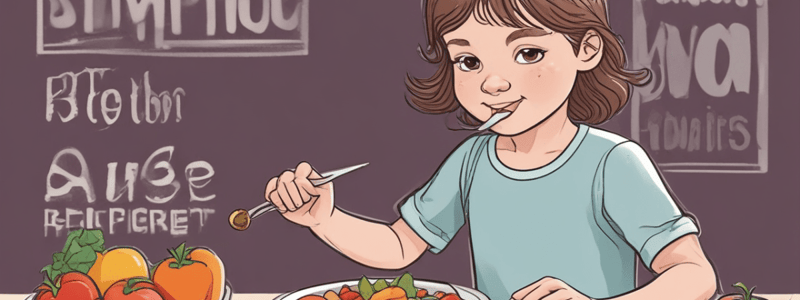Podcast
Questions and Answers
What is an unintended consequence of using food items as rewards?
What is an unintended consequence of using food items as rewards?
- Children eat more fruits and vegetables
- Children refuse to eat vegetables
- Children develop emotional eating patterns (correct)
- Children learn to eat only when they are hungry
Why should parents avoid making 'if-then' contingency statements during mealtimes?
Why should parents avoid making 'if-then' contingency statements during mealtimes?
- Because it encourages overeating
- Because it makes mealtime too long
- Because children may not like the foods being offered
- Because it promotes a negative relationship with certain foods (correct)
What can encouraging children to finish all their food lead to?
What can encouraging children to finish all their food lead to?
- Unhealthy eating patterns and potentially lead to weight issues (correct)
- Healthy eating patterns
- Improved self-regulation of food intake
- Increased interest in trying new foods
What is the result of rewarding children for eating foods they already enjoy?
What is the result of rewarding children for eating foods they already enjoy?
Why is avoiding food-based rewards an effective strategy for promoting healthy eating habits in children?
Why is avoiding food-based rewards an effective strategy for promoting healthy eating habits in children?
What is a beneficial approach to mealtime?
What is a beneficial approach to mealtime?
What is a way to build a positive association with a variety of foods?
What is a way to build a positive association with a variety of foods?
What is the recommended approach to presenting foods during mealtimes?
What is the recommended approach to presenting foods during mealtimes?
What can involving children in meal planning and preparation do?
What can involving children in meal planning and preparation do?
What is the goal of focusing on positive reinforcement and education?
What is the goal of focusing on positive reinforcement and education?
Flashcards are hidden until you start studying
Study Notes
Encouraging Peaceful Mealtimes
- Fostering a positive relationship with food and promoting healthy eating habits in children requires encouraging peaceful mealtimes.
Avoiding Counterproductive Reward Strategies
- Using food items as rewards can create unhealthy associations with those foods, leading to emotional eating patterns and disrupting natural hunger and satiety cues.
- Food rewards can make children eat for reasons other than hunger, such as seeking comfort or celebrating.
- Avoid making "if-then" contingency statements, as they can reinforce the idea that some foods are "good" and others are "bad," leading to a negative relationship with certain foods.
Unhealthy Reward Practices
- Rewarding children for eating foods they already enjoy can undermine their intrinsic motivation to eat those foods and create confusion about their own preferences.
- Encouraging children to finish all their food regardless of their hunger cues can promote overeating and disregard their natural ability to self-regulate their intake.
- This practice can lead to a disconnection from their body's signals, making it harder for them to recognize when they are full.
Alternative Approaches
- Create a positive and relaxed mealtime environment to encourage children to explore different foods at their own pace, without pressure or conditions.
- Praise children for trying new foods, regardless of the outcome, to build a positive association with a variety of foods.
- Involve children in meal planning and preparation to increase their interest in eating a diverse range of foods and teach them about nutrition in a practical and engaging way.
Studying That Suits You
Use AI to generate personalized quizzes and flashcards to suit your learning preferences.




